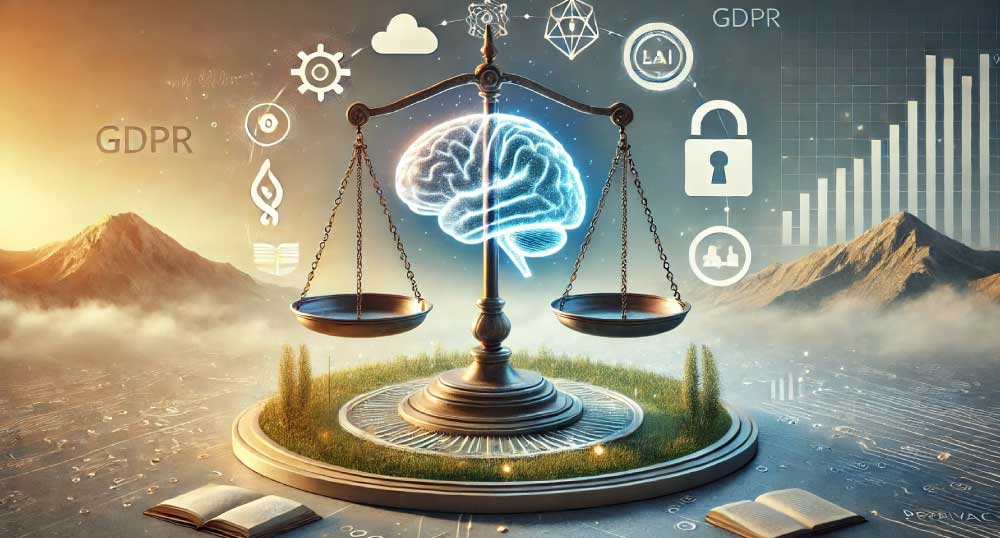Artificial Intelligence (AI) has rapidly transformed our world, offering unprecedented convenience and innovation. From personalised recommendations to life-saving medical breakthroughs, AI has become an integral part of our daily lives. However, this technological advancement comes with a significant trade-off: privacy. The more AI learns about us, the more data it collects, raising concerns about the potential misuse of personal information. In this blog, we will delve into the intricate relationship between AI and privacy, exploring both the benefits and risks of sharing personal data.

The Benefits of Sharing Personal Data with AI
While AI has raised significant concerns about data privacy and surveillance, it also offers undeniable benefits. By analysing vast amounts of personal data, AI systems can provide highly personalised recommendations, improving user experience and satisfaction. For instance, streaming platforms like Netflix use AI to suggest shows and movies based on viewing history, enhancing user satisfaction. This level of personalization can extend beyond entertainment, touching on areas such as shopping, where e-commerce platforms use AI to recommend products, thereby improving customer satisfaction and driving sales.
Moreover, AI has the potential to revolutionise healthcare. By analysing medical records and genetic data, AI can assist in early disease detection, drug discovery, and personalised treatment plans. Sharing personal health information can contribute to groundbreaking medical advancements, as seen in initiatives like Google’s DeepMind or healthcare. AI-powered tools can predict disease outbreaks, tailor treatments to individual patients, and even assist in surgical procedures, leading to more effective and efficient healthcare systems.
AI is also playing a crucial role in the development of smart cities. By collecting and analysing data from various sources, AI can optimise traffic flow, reduce energy consumption, and improve public safety. In such environments, personal data helps create a more connected and responsive urban space, enhancing the quality of life for residents.

The Risks of Sharing Personal Data with AI
Despite the allure of personalised experiences and medical breakthroughs, the risks associated with sharing personal data cannot be ignored. The most pressing concern is privacy breaches. High-profile data breaches, such as the Equifax breach , underscore the importance of stringent data protection. Cyberattacks targeting AI systems can expose sensitive information, leading to identity theft, financial loss, and reputational damage. The threat is not limited to financial data; breaches involving personal health information or location data can have severe consequences, including physical harm or harassment.
Furthermore, the collection and analysis of personal data can be used for surveillance and manipulation. Governments and corporations may exploit AI to monitor individuals’ behaviour, track their online activities, and influence public opinion, as discussed in this article by the Brookings Institution. This raises serious concerns about freedom of expression and privacy rights. In some instances, AI-driven surveillance has been linked to the suppression of dissent and the erosion of civil liberties, highlighting the darker side of this technology.
Another critical issue is the potential for AI to perpetuate biases. AI systems trained on biassed data may make discriminatory decisions, as evidenced by research from the Algorithmic Justice League For example, AI algorithms used in hiring processes could inadvertently favour certain demographics over others. This not only undermines fairness but also exacerbates social inequalities. The use of biassed AI in criminal justice, lending, and other critical areas can have far-reaching negative impacts on marginalised communities.

Striking a Balance
To harness the benefits of AI while safeguarding privacy, a delicate balance must be achieved. Implementing principles outlined in regulations like the General Data Protection Regulation (GDPR) and the California Consumer Privacy Act can help achieve this balance. These regulations emphasise the importance of transparency, user consent, and the right to access and delete personal data.
Several strategies can be employed to mitigate risks:
Data Minimization: Collect only the necessary data for AI systems to function. This approach reduces the amount of data at risk and limits the potential for misuse.
Data Anonymization: Remove personally identifiable information whenever possible. Anonymized data can still be useful for AI without compromising individual privacy.
Transparency and Accountability: Clearly communicate data practices to users and hold organisations accountable for data protection. This builds trust and ensures that users are aware of how their data is being used.
Strong Data Protection Laws: Implement robust regulations to safeguard individuals’ rights and privacy. Effective enforcement of these laws is crucial to ensuring compliance and protecting citizens.
User Education: Empower individuals to understand the implications of sharing personal data and make informed decisions. Educated users are more likely to take steps to protect their privacy and demand better practices from organisations.

Conclusion
The relationship between AI and privacy is a complex and evolving issue. While AI offers immense potential for improving our lives, it is essential to prioritise data protection and individual rights. By striking a balance between innovation and privacy, we can harness the power of AI while safeguarding our personal information. The future of AI depends on our ability to navigate this delicate balance, ensuring that technological progress does not come at the cost of our fundamental rights and freedoms.

